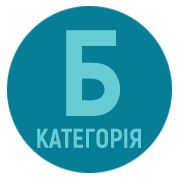LYRIC POETRY OF LINA KOSTENKO IN POLISH TRANSLATION (TRANSLATOR’S DILEMMAS)
DOI:
https://doi.org/10.32782/2307-1222.2023-55-5Keywords:
artistic translation, Lina Kostenko, lyric poetry, translator’s dilemmas, translation strategiesAbstract
This article deals with the problem of artistic translation and, more specifically, poetic translation. The difficulties faced by the translator in the process of translation and the strategies adopted in the face of them were considered. Selected poems of Lina Kostenko were used as illustrative material: I will not ask people for strength (Ukr. Я в людей не проситиму сили), Let it be light. By the touch of a pen (Ukr. Хай буде легко. Дотиком пера) and Bright lakes have blushed (Ukr. Зашарілись ясні озера), from the poetry collections Rays of the earth (ukr. Проміння землі), Uniqueness (ukr. Неповторність) and Sails (ukr. Вітрила) respectively. Their translations by Andrzej Nowak were discussed in juxtaposition with the proposals of the Author of the article. On this basis, it can be concluded that both the translation of an artistic text itself and the evaluation of such a translation is a very difficult task. Particularly because literary translation is the result of a subjective interpretation of the original text by the translator, who then, in the production process, assumes the role of creator of the text, envisaged to function independently in the space of the target culture. The multiplicity of potential ways of perceiving the original work and alternative means of expression enables translator series to emerge. When attempting a translation, the translator determines from the outset which components of the plan of form and content he or she considers crucial to interpreting the work and to providing the addressee with analogous aesthetic impressions, and which of these he or she is prepared to omit or transform when this becomes necessary due to differences between language systems. In the case of poetic translation from Ukrainian into Polish, it is a huge challenge for the translator to maintain rhythm, as the prosodic features of Polish language, especially the presence of a paroxytonic accent, cause phonological words to be arranged differently than in the original text, in which a variable accent provides a greater range of possibilities for their configuration.
References
Balcerzan, E. (1998). Poetyka przekładu artystycznego. W: tegoż, Literatura z literatury (strategie tłumaczy). Katowice. 17-31.
Barańczak, S. (1990). Mały, lecz maksymalistyczny Manifest translatologiczny albo: Tłumaczenie się z tego, że tłumaczy się wiersze również w celu wytłumaczenia innym tłumaczom, iż dla większości tłumaczeń wierszy nie ma wytłumaczenia. „Teksty Drugie: teoria literatury, krytyka, interpretacja”, nr 3. 7-66.
Korniejenko, A. (2018). Wstęp [Do Poezji Wasyla Stusa]. W: Стусознавчі зошити. Науковий альманах, z. 4. Упорядники: О. Соловей, О. Пуніна. Вінниця: Простір Літератури. 44-66.
Kostenko, L. (1997). I dzień, i noc, i mgnienie…, przeł. A. Nowak. Kraków: Oficyna Literacka.
Krysztofiak, M. (1996). Przekład literacki a translatologia, wyd. II, Poznań: Wydawnictwo Naukowe Uniwersytetu im. Adama Mickiewicza w Poznaniu.
Szczerbowski, T. (2011). Rosyjskie teorie przekładu literackiego. Kraków: Wydawnictwo Naukowe Uniwersytetu Pedagogicznego.
Tokarz, B. (2010). Spotkania. Czasoprzestrzeń przekładu artystycznego. Katowice: Wydawnictwo Uniwersytetu Śląskiego.
Словник української мови: в 11 томах. Том 3, 1972. С. 412. Зашарітися. URL: http://sum.in.ua/s/zasharitysja [21.01.2023].
Костенко, Л. Поезія. Електронна Бібліотека. URL: https://www.litmir.me/br/?b=266487&p=1 [21.01.2023].
Словник української мови: в 11 томах. Том 9, 1978. С. 799. Студений. URL: http://sum.in.ua/s/studenyj [21.01.2023].










